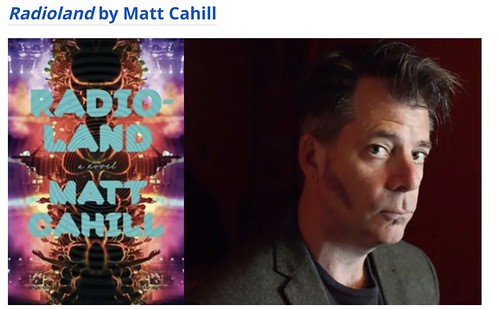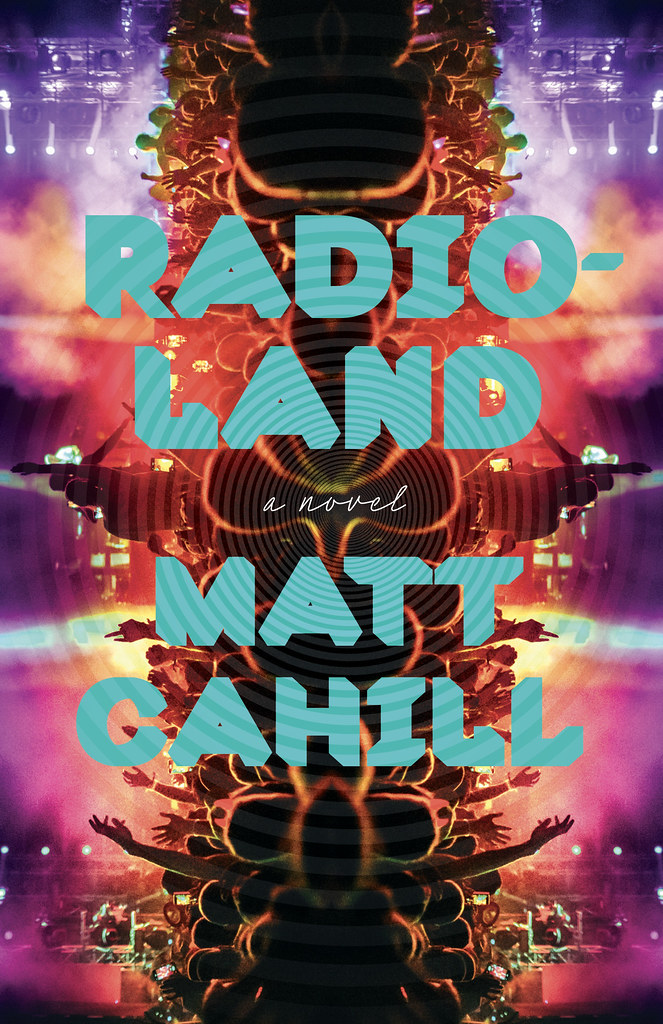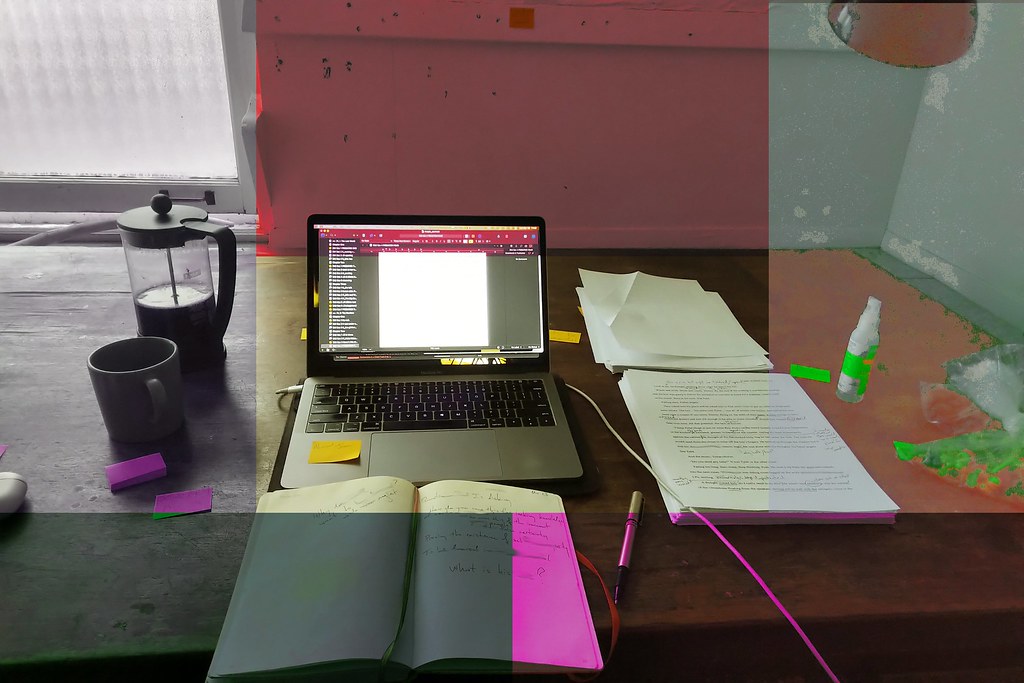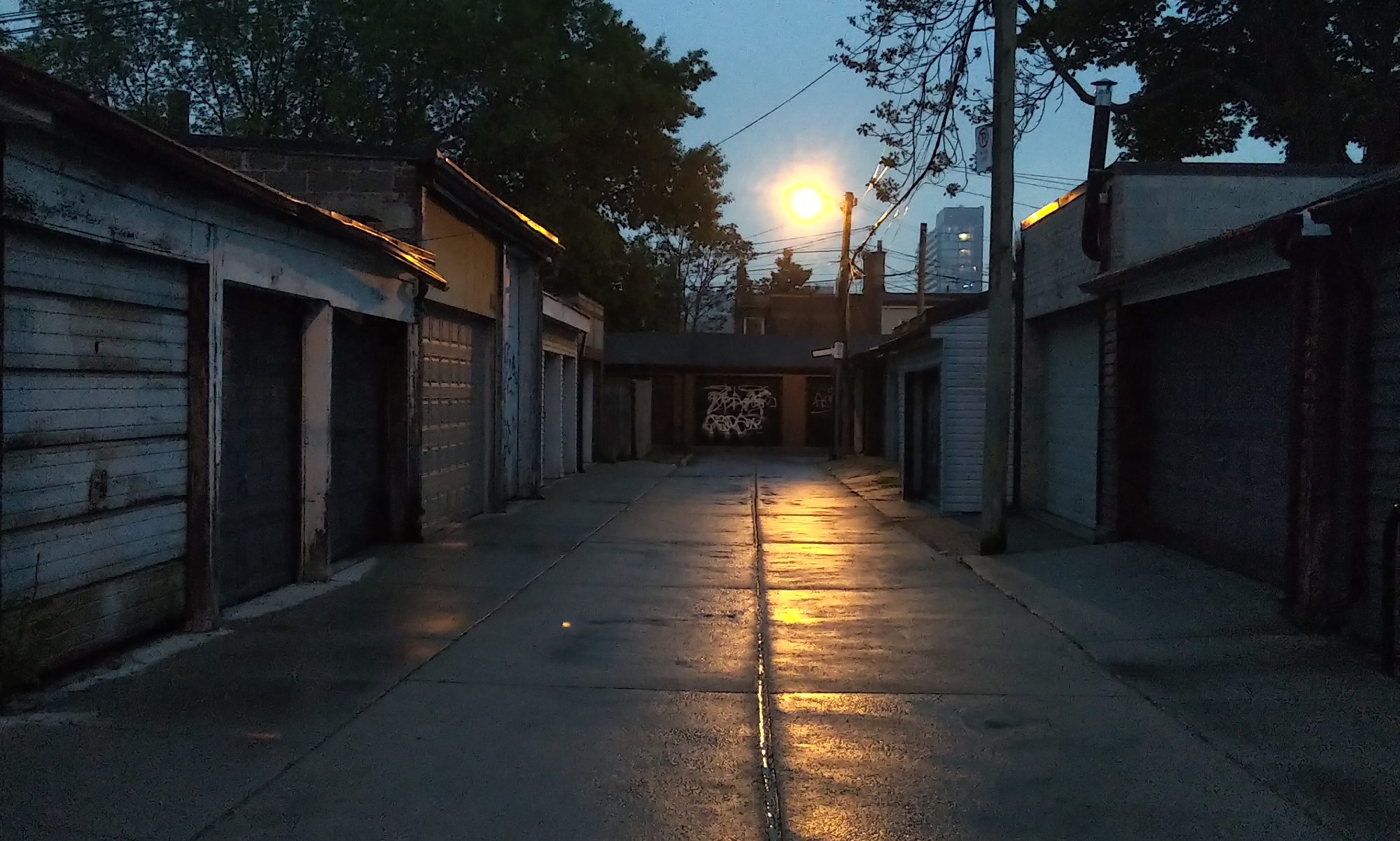Also coming up in November, if you’re going to be in Toronto on November 2nd, I’m inviting you to the book launch for Radioland. It’s happening at Burdock Brewery, 1184 Bloor St. W (a few steps away from Dufferin subway) and I’ll be joined by fellow authors A.G. Pasquella (launching his novella collection, Welcome to the Weird America) and Amber McMillan (launching her poetry collection This is a Stickup).
September Update
Regular visitors have probably been frustrated with the lack of updates here. So have I. The truth is that I’ve been swamped with doing the finishing touches on Radioland…and taking care of an ailing parent. I cannot express how exhausting the last while has been, on so many personal levels.
The good news is that, as of Friday, I signed-off on the last of the changes to the manuscript. It is, for all intents and purposes, out of my hands…which is both satisfying and frightening.
I finally have had time to update my website as well as post an update here (and add Radioland to the sidebar links). My next task is to gird myself for publicity, which I’m both excited for…and intimidated af. If there’s one thing I need to work on it’s getting out of my Writer Head and speaking about the book so that someone who isn’t in my head can understand what it’s actually about, which would be easier if I hadn’t written a fairly complex novel. There are worse problems.
Also…

I should mention that Radioland was picked as one of CBC Books fall fiction titles!
Anyhoo, I hope to be here more regularly.
Radioland: Cover Reveal and Pre-Order!
Hello all,
It’s been a time-and-a-half to get to this point, so it’s with a mixture of relief and exhaustion that I’m able to share the cover for my next novel, Radioland.

Nice, eh? The cover is by designer extraordinaire Ingrid Paulson.
This book has taken a lot work, and I can’t wait for you all to read it. Here’s another thing: it’s now available for pre-order, which means that you can order it now, and when it’s released (currently looking like October) it will get shipped to you ASAP then. Presales are also cool b/c they can build interest from stores, retailers, etc, so there’s that too. I trust you to do the right thing.
You can read more about Radioland on the publisher’s site (where you can also pre-order it): Wolsak & Wynn
You can also bug your local independent bookstore or local library to order it for you.
You can also pre-order it from these folks, too:
Writing Adv*ce: Changing Things Up
Well over two months without a writing project to put my mind to, and I’m still alive and functioning, if sometimes feeling purposeless. I find myself asking what “normal” is after all. Last year, with all my writing haunts closed because of lockdowns, I was stuck writing from home, a 750 square ft shared condo w/ a terrace. I slapped on a pair of over-the-ear headphones, put my head down and pushed myself to lay at least 1,000 words down per weekend, which, given I had nowhere to go, ended up being a successful, if arbitrarily chosen, formula (prior to this, my formula was a little more haphazard: go out, sit somewhere and fucking write for a least two hours — no emphasis on word count or quantitative stuff. I have thoughts on this I’ll share later). By November of 2020 I had the the first draft of Book Three. It felt like I’d gone to a Writer’s Gym, if such a thing existed, and getting so much done in such a comparatively short period of time had a lot of implications on how I saw and approached my craft. In short, it became less magical / alchemical and more about persistence / stamina. I should qualify “magic / alchemical” as to be a figurative way of saying “having the elements and inspiration of your project more or less come to you through a more slacker-friendly means; organic but not undisciplined.”
In 2020 I found that less (choice in where I wrote) begat more (output, inspiration-by-diktat), and I’m happy to have some time to reflect on this now. When I’m lucky enough to be able to afford a week at a writing retreat it’s different — those times are purpose-built, so of course I’m going to be productive (and also I tend to use retreats for revising rather than creating raw material, though that inevitably happens in the process). The question is going to be how I approach writing now that my old haunts are opening up again, or at least the ones that haven’t shut down.
I’m careful to note that epiphanies generated under extraordinary circumstances sometimes only make sense under extraordinary circumstances. I know I can deliver the goods — quantitatively and qualitatively — in a single sitting whereas before I would’ve felt chuffed if I’d been able to do both. Speaking of being careful, I also want to remind myself that I didn’t have a life for over a year, on top of a full-time day job that became exacerbated by my own anxiety and the collective anxiety of clients and everyone around me. I’m not, in other words, championing or abandoning any particular approach, only noting what is possible under certain circumstances, some of which may be more doable and/or replicable than others. Let’s not forget there are also half-ways and acceptable compromises in any art form. I’m happy with what I was able to accomplish with Book Three, but I fear a top-down, capitalist you-should-obviously-write-a-book-a-year bullshit coming into my life. I’m not privately wealthy. I’m not a trust fund kid. I got bills. I need to think about what my life is going to look like in a decade, given that I have no pension, that I’m self-employed, and that any notion of being a Full-Time Author is more than a little naive.
I’m lucky and grateful for the opportunities I’ve been able to take advantage of, but making writing its own career is a bit of a pipe dream when you’re 50. That’s reality.
Gap
I handed off the first substantive pass of Radioland a few weeks back to my editor and, lo and behold, two weekends ago found myself without a novel to work on, which was the first time (I’m not counting vacations, etc, obviously) I’ve not had a novel to work on in years. It was and is such a weird feeling.
I’ve been working on Radioland since about 2016, and last year, when it was being circulated to publishers, I was working on Book Three, which is currently simmering in a figurative pot as I wait to see if I can get any C/O/T Arts Council grants to be able to afford an editor for a substantive reading of it. I’ve never gotten a grant in my life, which is not to say that my previous applications have been sterling or anything — it’s just that I’m not hopeful. Windfalls are for other people, or so I tell myself. And yet it’s silly if I don’t try.
I’m not going to get notes from the editor on Radioland until August, and I’m trying not to reflexively fill in the intervening time with — surprise! — another writing project (though I wouldn’t put it past me). I’d like to give myself time to reflect.
I don’t like the literary world. I don’t feel I fit in, which is saying something considering writers are interloping creatures to begin with. There’s a lot of smarm, a lot of performative politics, a lot of preciousness, a lot of passive aggressive bullshit, and a lot of public ass-kissing. I don’t want to get caught up in any of it. I don’t want its insecure “loving” hypocrites, or its logrolling. All of this obscures the highlights: the truly deserving people (writers, publishers, editors, publicists, agents, reviewers, and readers) whose passion and support for others are unwavering.
I just want to write and find (let alone build) an audience. And I worry the day will come when I have to choose between belonging to the literary community (and potentially worsening my eyesight because of constant eye-rolling) or just walking away. Or I can just get off Twitter — ha.
I also want to think hard about the future projects I need to get off my chest, versus the ones that are “nice to have”. I’m over 50, and while my ability to churn out work is better than ever, I can see how it’s possible to have resentment build for projects I commit to that end up eating my weekends and spare moments. I suppose to some extent I don’t know what I want the next 50 years to look like. I know what I don’t want it to look like, let’s put it that way. Among other things, I don’t want to feel (or be made to feel) like I’m competing with people in their 20s, like in some fucked up Logan’s Run reboot, nor do I wish to see the landscape scooped by a literary version of Spotify, where we are asked to write faster for our rewards.
It’s been a long year.
Wr*ting Advice: A Slight Return
I’ve written before about writing advice. I’ve even created a somewhat cheeky sub-title for certain articles (Wr*ting Advice) about writing advice.
Let’s review the stuff I hate:
-
- writing advice ends up being vague because when you write writing advice for a general audience you’re either speaking to someone more advanced (and leaving beginners out) or speaking to someone about basics (and leaving the more advanced out).
- same as above, but with respect to what type of writing we are talking about; in general, when I’m writing about writing advice I’m writing about writing fiction (though I’m sure there are applications well beyond), but even then, what kind of fiction? Highbrow literary fiction? Genre (romance/horror/SFF)? Something in-between?
- perhaps most hated of all is the pervasiveness of writing advice, which seems to have become its own cottage industry (not, I wish to clarify, writing workshops, which can be worth their weight in gold). When I see interviews with animators are they asked what advice they have for other animators? No. When I see interviews with performing artists (dancers, singers) are they asked what advice they have for other performing artists? No. Now, I’m not thick, I get it: writing is easier to access (all you need at bare minimum of cost is a pencil and a piece of paper) and so there are always going to be people trying it out, which is cool. It’s the disparate mess those seeking direction have to wade through that I feel bad about.
This all said, I’d like to mention a book that I found very helpful at a time when I decided to begin taking writing — the labour of, as well as the business of — seriously. I’m not sure whether I would qualify it as a “self-help” book, however it’s likely to be categorized as such. It’s called Art & Fear: Observations on the Perils (and Rewards) of Artmaking, written by David Bayles and Ted Orland. The book was inspired by what its authors saw around them as they entered their 30s, namely that their artist peers were dropping out. The book is, in a sense, an examination of why that was, and delves into matters both practical and psychological without being overly technical in either area.
To this day, I use some of the book’s observations about perfectionism and artistic process in my work with clients (artmakers or not). If there’s one thing I walked away with personally (and I’m happy to say I walked away with several observations), it’s the importance of not getting hung up on any one project to the detriment of others (present or future). When you’re a beginner it’s easy to want cling to any proof that you’re good; this especially holds true for those without the means/opportunities to attend a writing workshop or join a writer’s group. The problem with this — especially with more ambitious (in scope and/or length) projects — is that one might be tempted to continue working on a particular project for a very, very long time (or submitting it in vain to every. single. publisher) and leaving other ideas by the wayside in the process. It’s not about whether that original idea is good/not-good, it’s about how much of your creative life (which, for those of us who need to pay rent for a living doing other things, is finite) you’re expending on one single thing as opposed to moving on to the next idea and, along the way, seeing progress of a different kind; going from “this is good” to “this is different/more advanced.”
It was first published in 1985. I read it in 2005, and I’m sure it’s just as useful for someone in 2021. If you decide to buy this book (or any), please consider purchasing from a retailer who isn’t Amazon, thank you.
One thing I will also say, specifically about any sort of guide or self-help book, is that its inspirational value is typically a combination of its contents and where you are. It can be a bit like match-making: someone you meet when you’re 23 might not be a good fit, however they might be a perfect fit when you’re 31. This brings me back to what I was saying in the beginning: when seeking writing advice, having an understanding of where you are is just as important as whatever ballyhoo’d resource people are recommending.
Writing Adv*ce: Revising
Revising is one of the most important aspects of writing. It’s also the most unsexy, and the hardest to explain (and by explain I mean “gain sympathy”).
You have your first draft done. Could be your second. Could be your fifth. Every project is different, every format is different, every writer is different. No one’s judging here. The thing is, you know it’s missing stuff, or, the stuff that’s there that isn’t missing is maybe not as well communicated as could be. Or it’s out of order. Or confusing.
So, you hit ⌘-P and print that bastard out (preferably on recycled paper, if possible). You grab a pen and go through line by line and find all the guilty suspects — the lazy punctuation, the nebulous internalized dialogue, the parts that should sing but don’t — and you mark it up, complete with thoughts/notes/feelings for future reference.
The next step is sitting down and implementing those revision notes into the current draft on your computer. Some people might just use the marked up print out as their Bible. I go one step further and re-read from scratch, making changes on my laptop as I go *and then* check the printed copy to see if I’ve missed anything. It’s tedious as fuck (especially on on a novel FML) but it tends to balance, for lack of a better way of putting it, the zealotry that can come with revising on paper. It’s easy to sit with a print out and a pen and go revisit this and skip that. The truth is that sometimes our sentiment during that process can be impatient and ill-judged, which is why I like to re-read and see whether I decide to leave things in that have a way of justifying their existence on second glance.
When you’re revising you’re having a dialogue with yourself. It’s a little different than the dialogue you have when writing new stuff. New stuff is new. It’s sexy and glows and makes us feel good, and we’re happy when we’re able to empty it onto the page, so volume — even if it’s garbled — always feels like striking a gold mine. When we’re revising we step back and attempt to look at what we’ve written within the context of the whole project. The hardest part of revising, for me, is the trifocal quality of how we are reading the text — approaching it as the ideal reader, approaching it as the editor, approaching it as a total stranger. Does it hold our attention? Does the paragraph work within the chapter or am I just trying to shoehorn a smart-sounding insight that simply isn’t meant for this particular project.
Sometimes we don’t know. Sometimes it’s something we’ve been working on for years and we feel like we’ve lost perspective. Does it rock? Does it suck? Does it read like I’ve shoved my head up my ass? It can be difficult to tell when we’re too close. Add some insecurity to that and revising can feel interminable. This is when you take a break (I’m talking days if not weeks).
But here’s the thing: revising is where your piece finds both its soul and its feet on the ground. Greatness is made in the revision process. First drafts are necessary evils. If you are starting out and feel that your first draft is perfect, you’re likely going to need to adjust your perspective. And it’s hard, right, because it’s so easy to construe the weaknesses that an editor or reader might find in our work with the insecurities we might have with ourselves.
If writing was just that — literally just writing new material — then things would be much different. They would be worse. We wouldn’t learn what our bad habits are, we wouldn’t have that opportunity, when we feel we’ve hit a wall during revisions on a particularly hard chapter, to realize how we might alter things so that it finally works the way we originally wanted it to.
Revising is learning. And again, it is a dialogue with yourself. Be supportive. Don’t forget to mark up the stuff you like! Don’t forget to tell yourself what’s funny, or what’s particularly poignant. In many ways, revising mirrors the relationship we have with ourselves, so watch the trash talk. Accept that you are fallible. Everyone’s first draft looks like dog food. Be patient.
Just some thoughts.
(And kindly note a couple of things: I’m speaking specifically about fiction and creative non-fiction; other formats might require other approaches or appreciate different philosophies. And a golden rule: what works best for you is what’s most important.)
Radioland Update!
Hello all! I am extremely pleased to announce that RADIOLAND will be published in Fall 2022, with Wolsak & Wynn. It’s been a long haul with this one, and while I still have a fair amount of work ahead of me, it’s gratifying to know that not only will this book have a home, but that it will be with the same great team, including editor Paul Vermeersch, as THE SOCIETY OF EXPERIENCE.
(This wouldn’t have been possible without my agent, Kelvin Kong at K2 Literary.)
Here’s a summary of RADIOLAND (from my author site):
— RADIOLAND —
Kris is an alt-rock musician who abruptly drops out of his popular band to rake over an unprocessed trauma from his childhood; Jill is an outcast who operates in the shadows of the city, cursed with a dangerous type of magic that draws mysterious strangers to her. By chance, they start a correspondence with each other and a strange relationship begins – one that coils around their lives like a macabre spell. As they share their stories with one another, they each approach the source of their misery and risk losing themselves, even their lives, in a darkness that seems destined for them.
Everything Jill senses tells an intense story, so she numbs herself with alcohol to keep her head clear, hoping she’ll meet someone who can tell her how she came to be the way she is. Kris struggles to maintain his grip on reality as he pulls apart the threads that make up his identity. Working through fallen mentors, splintered identities, and substance dependency, the two of them try to help each other make sense of their lives, though it may ultimately reveal one of them as a serial murderer.
Radioland explores the absurdity of fame, the toxicity of trauma, and the morbid dangers unearthed as we seek a greater understanding of ourselves.
Radioland is Matt Cahill’s second novel, and steps further into the metaphysical social realism he has employed in his short fiction as well as in his debut novel, The Society of Experience, which Harper’s Bazaar magazine picked as one of the best of fall 2015.
“Parlour” in The Quarantine Review
Hello all — as I mentioned earlier, I have a new short story coming out into the world, and today it was published in Issue #5 of The Quarantine Review, which is their special pulp fiction edition. My short story, Parlour, is included with a number of other great writers. You can purchase it here or here.
ANOTHER New Short Story Alert
When it rains it pours, the cliché goes. I found out over the weekend that I will have another short story published, this time in Fusion Fragment, a speculative fiction publisher based in Ottawa.
Two things about this announcement that are significant:
- It’s going to be for their all-Canadian edition, to be released on July 1st 2021.
- This will be the first of four interrelated short stories that I’ve been polishing for the last few years, so I’m quite happy that one will finally be released into the wild.
Once again, as we get closer, I’ll spill more about the story and the pub date.



